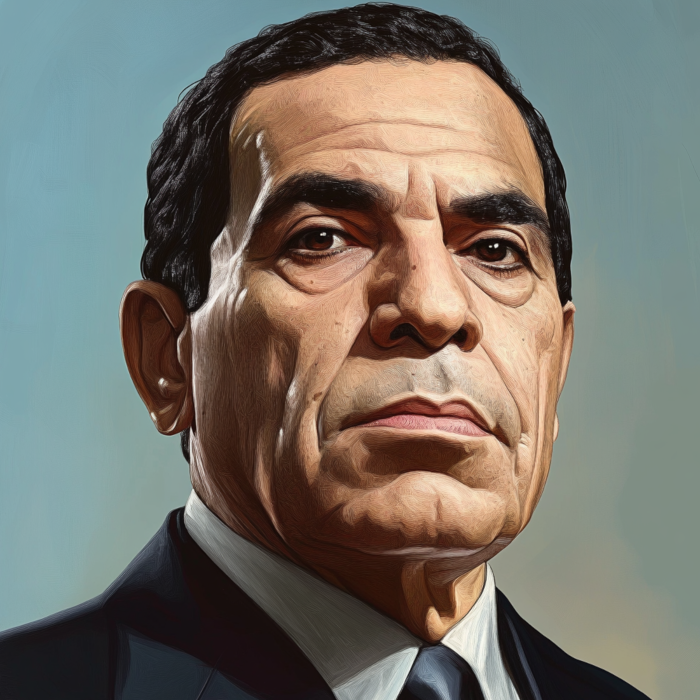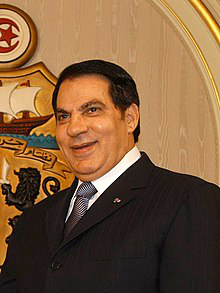


Zine El Abidine Ben Ali (1936–2019) was a Tunisian politician who served as the President of Tunisia from 1987 until his ousting in 2011. His presidency, which lasted for 23 years, was initially marked by economic growth and political stability but later became synonymous with corruption, authoritarianism, and widespread human rights abuses. Ben Ali's downfall in January 2011 was a pivotal moment in the Arab Spring, a wave of protests and uprisings that swept across the Arab world.
Early Political Roles: Upon returning to Tunisia, Ben Ali rose through the ranks of the military and intelligence services. He served as the director of military security and later became the director-general of the National Security. His effective handling of security matters during a period of unrest in Tunisia brought him to the attention of President Habib Bourguiba.
Prime Minister: In 1987, Ben Ali was appointed Prime Minister of Tunisia. During this time, Bourguiba, who was aging and increasingly unwell, became more erratic in his governance. Sensing an opportunity, Ben Ali, with the backing of the military and key political figures, moved to remove Bourguiba from power.
"Medical Coup" and Presidency: On November 7, 1987, Ben Ali declared Bourguiba unfit to govern due to his deteriorating health and assumed the presidency. This bloodless coup, often referred to as a "medical coup," was initially welcomed by many Tunisians who hoped for stability and reform after Bourguiba’s increasingly autocratic rule.
Early Reforms and Stability: Ben Ali's early years as president were marked by economic reforms that aimed to liberalize the economy and attract foreign investment. His government implemented measures to improve infrastructure, education, and health care, which led to some economic growth and improvements in living standards. Ben Ali also allowed a degree of political pluralism, legalizing some opposition parties and encouraging a more open political climate.
Authoritarian Rule: However, as his presidency progressed, Ben Ali became increasingly authoritarian. He consolidated power, rigged elections, and suppressed political opposition. The press was tightly controlled, and dissent was met with imprisonment, torture, and exile. The ruling party, the Constitutional Democratic Rally (RCD), dominated all aspects of political life, effectively making Tunisia a one-party state.
Corruption and Cronyism: Ben Ali's regime became infamous for its widespread corruption and cronyism. Members of Ben Ali’s family, particularly his wife, Leila Trabelsi, and her relatives, were accused of amassing vast wealth through their control of key sectors of the economy. This corruption led to growing public resentment, particularly as economic opportunities became increasingly limited for ordinary Tunisians.
Economic Decline and Unrest: By the late 2000s, Tunisia faced rising unemployment, inflation, and economic stagnation. The wealth gap between the ruling elite and the general population widened, leading to widespread discontent.
The Spark of Revolution: On December 17, 2010, a young street vendor named Mohamed Bouazizi set himself on fire in the town of Sidi Bouzid in protest against police corruption and harassment. Bouazizi’s self-immolation became the catalyst for nationwide protests against Ben Ali’s regime. The protests, fueled by social media, quickly spread across Tunisia, calling for political reform, economic opportunities, and an end to corruption.
Ben Ali’s Response: Ben Ali initially attempted to quell the unrest through a combination of force and concessions. He promised to create jobs, lower food prices, and allow greater political freedoms. However, these measures were seen as too little, too late, and failed to pacify the growing anger.
Flight from Tunisia: As the protests intensified and security forces began to falter, Ben Ali realized that his position was untenable. On January 14, 2011, after weeks of protests and escalating violence, Ben Ali fled Tunisia with his family, seeking refuge in Saudi Arabia. His departure marked the end of his 23-year rule and the first successful overthrow of an Arab leader during the Arab Spring.
Exile in Saudi Arabia: After fleeing Tunisia, Ben Ali lived in exile in Jeddah, Saudi Arabia, where he was granted asylum. Despite calls from the Tunisian government and international organizations for his extradition, Saudi Arabia refused to hand him over.
Trials in Absentia: In Tunisia, Ben Ali was tried and convicted in absentia on numerous charges, including embezzlement, corruption, and abuse of power. He and his wife were sentenced to lengthy prison terms, but these sentences were largely symbolic given that they remained outside of Tunisian jurisdiction.
Death: Zine El Abidine Ben Ali died on September 19, 2019, in Jeddah, Saudi Arabia, at the age of 83. His death marked the end of a controversial chapter in Tunisia’s history, though many Tunisians had already moved on from his rule in the years following the revolution.
Economic Legacy: Ben Ali’s economic policies had mixed results. While his early reforms brought some development and improved infrastructure, his later years were marred by corruption and economic mismanagement. The economic inequality and high unemployment that persisted under his rule were major factors in the Jasmine Revolution.
Human Rights and Political Repression: Ben Ali’s legacy is largely defined by his authoritarian rule and the repression of political freedoms. His government was notorious for its human rights abuses, including the torture of political prisoners, suppression of free speech, and the use of state security forces to maintain power.
Impact on the Arab Spring: Ben Ali’s downfall had a profound impact on the Arab world. His ouster inspired similar uprisings in other Arab countries, including Egypt, Libya, and Syria, leading to what became known as the Arab Spring. While the outcomes of these uprisings varied, Tunisia’s relatively successful transition to democracy stands out as a significant legacy of Ben Ali’s overthrow.
Mixed Reactions: In Tunisia, opinions on Ben Ali’s legacy are mixed. While many view his rule as a dark period of repression and corruption, there are some who remember the stability and economic growth of his early years. However, the widespread corruption and human rights abuses that characterized his later years have largely overshadowed any positive aspects of his presidency.
Zine El Abidine Ben Ali’s rule was a defining period in Tunisia’s modern history. His initial success in stabilizing and modernizing Tunisia was eventually undermined by authoritarianism, corruption, and social inequality, leading to his dramatic fall from power. His ousting marked the beginning of a new era for Tunisia and had far-reaching implications across the Arab world.

We use cookies
We use cookies and other tracking technologies to improve your browsing experience on our website, to show you personalized content and targeted ads, to analyze our website traffic, and to understand where our visitors are coming from. Privacy Policy.